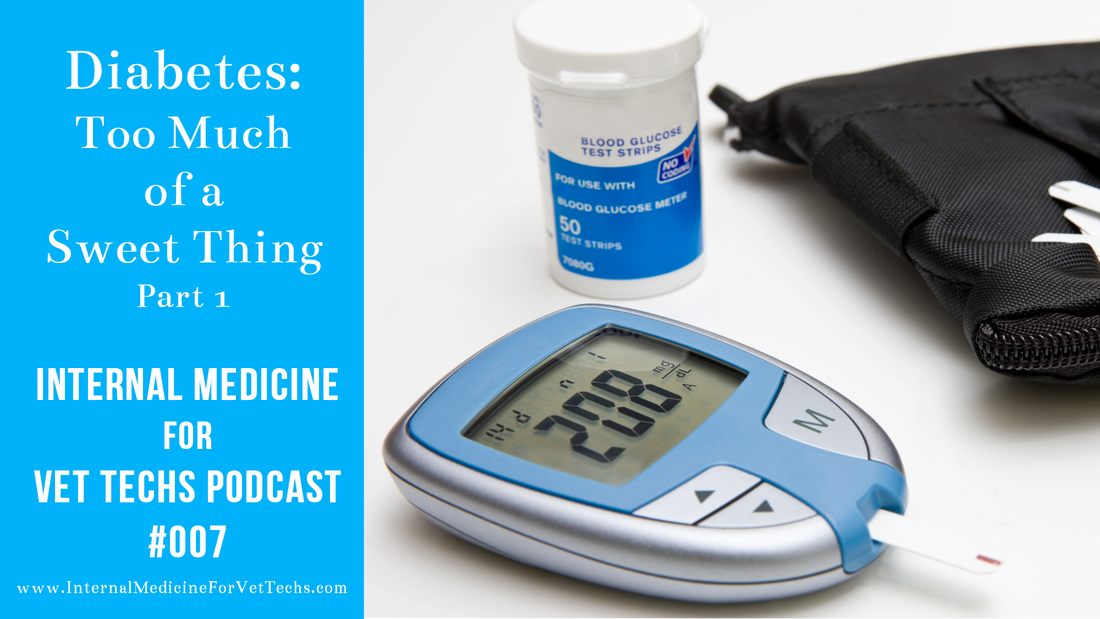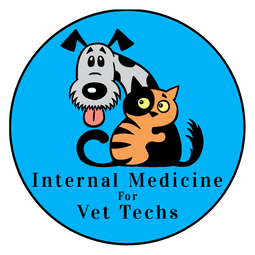|
This week is a two-parter, you know, because diabetes is never just a simple 45 minute conversation. Join us through the holiday while we cover the topic of "Too Much of a Sweet Thing".
Show Notes:
Join Yvonne Brandenburg, RVT, VTS SAIM and Jordan Porter RVT, LVT, VTS SAIM as we talk about:
-Yvonne and Jordan Continuing Education Certificate
Want to earn some RACE approved CE credits for listening to the podcast? You can earn between 0.5-1.0 hour of RACE approved CE credit for each podcast episode you listen to.
Join the Internal Medicine For Vet Techs Membership to earn and keep track of your continuing education hours as you get your learn on! Join now! http://internalmedicineforvettechsmembership.com/ 007 Diabetes: Too Much of a Sweet Thing Part 1 transcript powered by Sonix—the best audio to text transcription service007 Diabetes: Too Much of a Sweet Thing Part 1 was automatically transcribed by Sonix with the latest audio-to-text algorithms. This transcript may contain errors. Sonix is the best way to convert your audio to text in 2019. Yvonne Brandenburg, RVT, VTS SAIM: Yvonne Brandenburg, RVT, VTS SAIM: Jordan Porter, RVT, LVT, VTS SAIM: Yvonne Brandenburg, RVT, VTS SAIM: Jordan Porter, RVT, LVT, VTS SAIM: Yvonne Brandenburg, RVT, VTS SAIM: Jordan Porter, RVT, LVT, VTS SAIM: Yvonne Brandenburg, RVT, VTS SAIM: Jordan Porter, RVT, LVT, VTS SAIM: Yvonne Brandenburg, RVT, VTS SAIM: Jordan Porter, RVT, LVT, VTS SAIM: Yvonne Brandenburg, RVT, VTS SAIM: Jordan Porter, RVT, LVT, VTS SAIM: Yvonne Brandenburg, RVT, VTS SAIM: Jordan Porter, RVT, LVT, VTS SAIM: Yvonne Brandenburg, RVT, VTS SAIM: Jordan Porter, RVT, LVT, VTS SAIM: Yvonne Brandenburg, RVT, VTS SAIM: Jordan Porter, RVT, LVT, VTS SAIM: Yvonne Brandenburg, RVT, VTS SAIM: Jordan Porter, RVT, LVT, VTS SAIM: Yvonne Brandenburg, RVT, VTS SAIM: Jordan Porter, RVT, LVT, VTS SAIM: Yvonne Brandenburg, RVT, VTS SAIM: Jordan Porter, RVT, LVT, VTS SAIM: Yvonne Brandenburg, RVT, VTS SAIM: Jordan Porter, RVT, LVT, VTS SAIM: Yvonne Brandenburg, RVT, VTS SAIM: Jordan Porter, RVT, LVT, VTS SAIM: Yvonne Brandenburg, RVT, VTS SAIM: Jordan Porter, RVT, LVT, VTS SAIM: Yvonne Brandenburg, RVT, VTS SAIM: Jordan Porter, RVT, LVT, VTS SAIM: Yvonne Brandenburg, RVT, VTS SAIM: Jordan Porter, RVT, LVT, VTS SAIM: Yvonne Brandenburg, RVT, VTS SAIM: Jordan Porter, RVT, LVT, VTS SAIM: Yvonne Brandenburg, RVT, VTS SAIM: Jordan Porter, RVT, LVT, VTS SAIM: Yvonne Brandenburg, RVT, VTS SAIM: Jordan Porter, RVT, LVT, VTS SAIM: Yvonne Brandenburg, RVT, VTS SAIM: Jordan Porter, RVT, LVT, VTS SAIM: Yvonne Brandenburg, RVT, VTS SAIM: Jordan Porter, RVT, LVT, VTS SAIM: Yvonne Brandenburg, RVT, VTS SAIM: Jordan Porter, RVT, LVT, VTS SAIM: Yvonne Brandenburg, RVT, VTS SAIM: Jordan Porter, RVT, LVT, VTS SAIM: Yvonne Brandenburg, RVT, VTS SAIM: Jordan Porter, RVT, LVT, VTS SAIM: Yvonne Brandenburg, RVT, VTS SAIM: Jordan Porter, RVT, LVT, VTS SAIM: Yvonne Brandenburg, RVT, VTS SAIM: Jordan Porter, RVT, LVT, VTS SAIM: Yvonne Brandenburg, RVT, VTS SAIM: Jordan Porter, RVT, LVT, VTS SAIM: Yvonne Brandenburg, RVT, VTS SAIM: Jordan Porter, RVT, LVT, VTS SAIM: Yvonne Brandenburg, RVT, VTS SAIM: Jordan Porter, RVT, LVT, VTS SAIM: Yvonne Brandenburg, RVT, VTS SAIM: Jordan Porter, RVT, LVT, VTS SAIM: Yvonne Brandenburg, RVT, VTS SAIM: Jordan Porter, RVT, LVT, VTS SAIM: Yvonne Brandenburg, RVT, VTS SAIM: Jordan Porter, RVT, LVT, VTS SAIM: Yvonne Brandenburg, RVT, VTS SAIM: Jordan Porter, RVT, LVT, VTS SAIM: Yvonne Brandenburg, RVT, VTS SAIM: Jordan Porter, RVT, LVT, VTS SAIM: Yvonne Brandenburg, RVT, VTS SAIM: Jordan Porter, RVT, LVT, VTS SAIM: Yvonne Brandenburg, RVT, VTS SAIM: Jordan Porter, RVT, LVT, VTS SAIM: Yvonne Brandenburg, RVT, VTS SAIM: Jordan Porter, RVT, LVT, VTS SAIM: Yvonne Brandenburg, RVT, VTS SAIM: Jordan Porter, RVT, LVT, VTS SAIM: Yvonne Brandenburg, RVT, VTS SAIM: Jordan Porter, RVT, LVT, VTS SAIM: Yvonne Brandenburg, RVT, VTS SAIM: Jordan Porter, RVT, LVT, VTS SAIM: Yvonne Brandenburg, RVT, VTS SAIM: Jordan Porter, RVT, LVT, VTS SAIM: Yvonne Brandenburg, RVT, VTS SAIM: Jordan Porter, RVT, LVT, VTS SAIM: Yvonne Brandenburg, RVT, VTS SAIM: Jordan Porter, RVT, LVT, VTS SAIM: Yvonne Brandenburg, RVT, VTS SAIM: Jordan Porter, RVT, LVT, VTS SAIM: Yvonne Brandenburg, RVT, VTS SAIM: Jordan Porter, RVT, LVT, VTS SAIM: Yvonne Brandenburg, RVT, VTS SAIM: Jordan Porter, RVT, LVT, VTS SAIM: Yvonne Brandenburg, RVT, VTS SAIM: Jordan Porter, RVT, LVT, VTS SAIM: Yvonne Brandenburg, RVT, VTS SAIM: Jordan Porter, RVT, LVT, VTS SAIM: Yvonne Brandenburg, RVT, VTS SAIM: Jordan Porter, RVT, LVT, VTS SAIM: Yvonne Brandenburg, RVT, VTS SAIM: Jordan Porter, RVT, LVT, VTS SAIM: Yvonne Brandenburg, RVT, VTS SAIM: Jordan Porter, RVT, LVT, VTS SAIM: Yvonne Brandenburg, RVT, VTS SAIM: Jordan Porter, RVT, LVT, VTS SAIM: Yvonne Brandenburg, RVT, VTS SAIM: Jordan Porter, RVT, LVT, VTS SAIM: Yvonne Brandenburg, RVT, VTS SAIM: Jordan Porter, RVT, LVT, VTS SAIM: Yvonne Brandenburg, RVT, VTS SAIM: Jordan Porter, RVT, LVT, VTS SAIM: Yvonne Brandenburg, RVT, VTS SAIM: Jordan Porter, RVT, LVT, VTS SAIM: Yvonne Brandenburg, RVT, VTS SAIM: Jordan Porter, RVT, LVT, VTS SAIM: We don't always know which one was first. Was it the severe pancreatitis? Jordan Porter, RVT, LVT, VTS SAIM: Yvonne Brandenburg, RVT, VTS SAIM: Jordan Porter, RVT, LVT, VTS SAIM: If you've got a severe pancreatitis, that inflammation in the exocrine portion of the pancreas can cause damage to the tissues that are endocrine. Right? Or you have the endocrine that's not functioning well. You have this extreme high sugar and then the sugar is irritating to tissues, including the pancreas. So when you've got these numbers in the 500-600, you're causing tissue damage to the pancreas. Now we get pancreatitis because it's inflamed. It's mad. So it is this vicious circle. So sometimes it's hard to determine which one came first. So, just keep that in mind. You're probably going to get. Jordan Porter, RVT, LVT, VTS SAIM: Yvonne Brandenburg, RVT, VTS SAIM: Jordan Porter, RVT, LVT, VTS SAIM: Yvonne Brandenburg, RVT, VTS SAIM: Jordan Porter, RVT, LVT, VTS SAIM: Yvonne Brandenburg, RVT, VTS SAIM: Jordan Porter, RVT, LVT, VTS SAIM: Yvonne Brandenburg, RVT, VTS SAIM: Jordan Porter, RVT, LVT, VTS SAIM: Yvonne Brandenburg, RVT, VTS SAIM: Jordan Porter, RVT, LVT, VTS SAIM: Yvonne Brandenburg, RVT, VTS SAIM: Jordan Porter, RVT, LVT, VTS SAIM: Yvonne Brandenburg, RVT, VTS SAIM: Jordan Porter, RVT, LVT, VTS SAIM: Yvonne Brandenburg, RVT, VTS SAIM: Jordan Porter, RVT, LVT, VTS SAIM: Yvonne Brandenburg, RVT, VTS SAIM: Jordan Porter, RVT, LVT, VTS SAIM: Yvonne Brandenburg, RVT, VTS SAIM: Jordan Porter, RVT, LVT, VTS SAIM: Yvonne Brandenburg, RVT, VTS SAIM: Jordan Porter, RVT, LVT, VTS SAIM: Yvonne Brandenburg, RVT, VTS SAIM: Jordan Porter, RVT, LVT, VTS SAIM: Jordan Porter, RVT, LVT, VTS SAIM: Yvonne Brandenburg, RVT, VTS SAIM: Jordan Porter, RVT, LVT, VTS SAIM: Yvonne Brandenburg, RVT, VTS SAIM: Jordan Porter, RVT, LVT, VTS SAIM: Yvonne Brandenburg, RVT, VTS SAIM: Jordan Porter, RVT, LVT, VTS SAIM: Yvonne Brandenburg, RVT, VTS SAIM: Jordan Porter, RVT, LVT, VTS SAIM: Yvonne Brandenburg, RVT, VTS SAIM: Jordan Porter, RVT, LVT, VTS SAIM: Yvonne Brandenburg, RVT, VTS SAIM: Jordan Porter, RVT, LVT, VTS SAIM: Yvonne Brandenburg, RVT, VTS SAIM: Quickly and accurately convert audio to text with Sonix.Sonix uses cutting-edge artificial intelligence to convert your mp3 files to text. Thousands of researchers and podcasters use Sonix to automatically transcribe their audio files (*.mp3). Easily convert your mp3 file to text or docx to make your media content more accessible to listeners. Sonix is the best online audio transcription software in 2019—it's fast, easy, and affordable.If you are looking for a great way to convert your mp3 to text, try Sonix today. Question of the Week:
2 Comments
Jessie
1/28/2020 11:33:16 am
At my specialty hospital we do not use insulin CRI's, we give IV injections of regular insulin +/- dextrose every 2 hours as needed based on a chart created by the doctors. After listening to this episode, I actually started an insulin CRI for the first time for one of my patients, it was very helpful to have listed to this podcast shortly before starting the CRI. We did not continue the CRI for too long as my doctors were not seeing as well of a response. I guess my question is why use one over the other? In reading and listing to podcasts it sounds like it is more common for CRI's than IV injections. Also when running an insulin CRI, what should be running through the long line catheter since the regular IV fluids may have dextrose. I feel that both the dextrose and the insulin CRI may affect my results if I am pulling blood from that line. Thanks for any info!
Reply
Jordan Porter, RVT, VTS (SAIM)
1/28/2020 06:05:07 pm
Thanks so much for the comment Jessie! And congrats on using a CRI. Now, it is important to remember to run 50cc of the insulin through the line since it binds to plastic; if not done, you have have incorrect readings. I find CRIs are more commonly used, but a rapid change in glucose numbers is not normally seen. With CRIs we expect to see a slow gradual decrease that we also manage with the calculated dextrose %- if you need a insulin/dextrose sheet, there is one in the technician treasure trove. As for the long lines- you're going to want multi-lumen catheters for best results. Ideally 3; one for sampling, one for insulin, and one for dextrose. If you have more questions please feel free to email me at [email protected]
Reply
Leave a Reply. |
Looking for a specific topic? Search below to get the right episode!
Sign Up for your password for the Technician Treasure Trove! Where to ListenArchives
June 2024
Categories
All
|
Visit www.InternalMedicineForPetParents.com to learn more about us

 RSS Feed
RSS Feed

